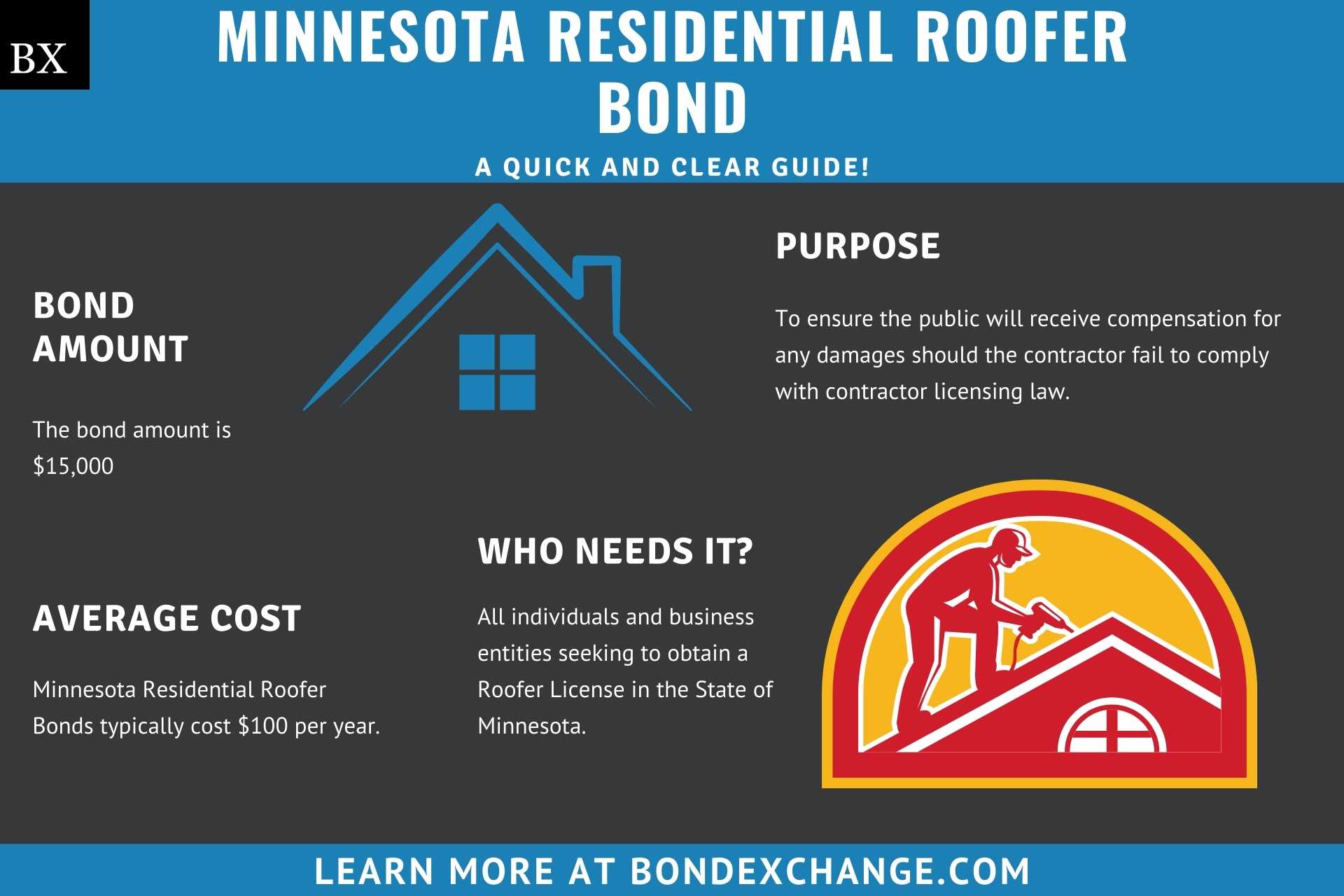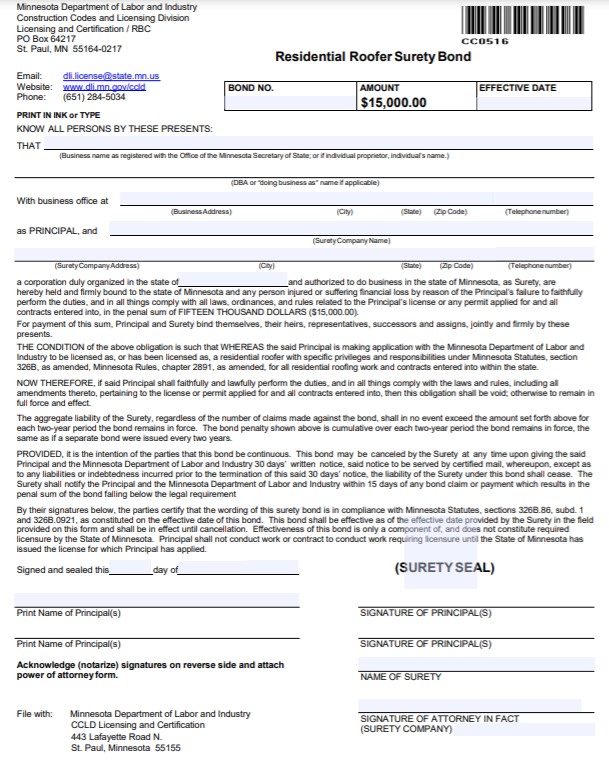Minnesota Residential Roofer Bond: A Comprehensive Guide
February 15, 2021

This guide provides information for insurance agents to help roofers on Minnesota Residential Roofer Bonds
At a Glance:
- Average Cost: $100 per year
- Bond Amount: $15,000
- Who Needs It: All individuals and business entities seeking to obtain a Roofer License in the State of Minnesota
- Purpose: To ensure the public will receive compensation for any damages should the contractor fail to comply with contractor licensing law
- Who Regulates Residential Roofers in Minnesota: The Minnesota Department of Labor and Industry (MDLI)
Background
Minnesota Administrative Rule 326B.805 requires residential roofers operating in the state to obtain a license with the MDLI. The Minnesota legislature enacted licensing laws and regulations to ensure that roofers engage in ethical business practices. In order to provide financial security for the enforcement of the licensing law, residential roofers in Minnesota must purchase and maintain a $15,000 Residential Roofer Surety Bond to be eligible for licensure.
What is the Purpose of the Minnesota Residential Roofer Bond?
Minnesota requires contractors to purchase the Residential Roofer Bond as part of the application process to obtain a Roofer License. The bond ensures that the public will receive compensation for financial harm if the contractor fails to comply with licensing regulations. In short, the bond is a type of insurance that protects the public if the contractor breaks licensing laws.

How Can an Insurance Agent Obtain a Minnesota Residential Roofer Surety Bond?
BondExchange makes obtaining a Minnesota Residential Roofer Bond easy. Simply login to your account and use our keyword search to find the “contractor” bond in our database. Don’t have a login? Enroll now and let us help you satisfy your customers’ needs. Our friendly underwriting staff is available by phone (800) 438-1162, email or chat from 7:30 AM to 7:00 PM EST to assist you.
At BondExchange, our 40 years of experience, leading technology, and access to markets ensures that we have the knowledge and resources to provide your clients with fast and friendly service whether obtaining quotes or issuing bonds.
Is a Credit Check Required for the Minnesota Residential Roofer Surety Bond?
No, a credit check is not required for the Minnesota Residential Roofer Bond. Because this bond is considered relatively low-risk, the same low rate is offered to all roofing contractors in Minnesota.
How Much Does the Minnesota Residential Roofer Surety Bond Cost?
The $15,000 Minnesota Residential Roofer surety bond costs just $100 per year
How Does Minnesota Define “Residential Roofer”?
To paraphrase Minnesota Statute 326B.802, a residential roofer is any person who repairs, alters or performs work on residential roofing structures as an independent business. Residential roofers do not construct new roof systems.
How do Residential Roofers Apply for a License in Minnesota?
Contractors in Minnesota must navigate several steps to secure their Roofer License. Below are the general guidelines, but contractors should refer to the DLI’s licensing page for details on the process.
License Period – The Minnesota Roofer License expires on March 31 of each year and must be renewed before the expiration date
Step 1 – Start a Business
Contractors must create a business entity and register with the Minnesota Secretary of State prior to submitting their license application
Step 2 – Hire a Qualifying Individual
Contractors must employ at least one individual who is capable of handling the day to day operations of the business. Qualifying individuals must complete the Qualifying Person Designation Form, and pass the required licensure exam. There is no experience requirement to become a qualified individual. Qualifying individuals must complete the annual continuing education requirements for the license.
Step 3 – Purchase Insurance
Residential Roofers must purchase liability insurance with a minimum limit of $300,000 per occurrence, with a minimum of $10,000 property damage coverage. Contractors with employees must also purchase workers’ compensation insurance.
Step 4 – Purchase a Surety Bond
Contractors must purchase and maintain a $15,000 residential roofer bond
Step 5 – Complete the Application
All new contractor regulatory license applications should be completed online. Completed applications should include the following items:
How Does a Minnesota Residential Roofer Renew Their License?
Roofers can renew their license online here. The Minnesota Roofer License expires on March 31 of each year and must be renewed before the expiration date
What Are the Insurance Requirements for the Minnesota Roofer License?
The State of Minnesota requires residential roofers to obtain liability insurance with a minimum limit of $300,000 per occurrence, with a minimum of $10,000 property damage coverage. Contractors with employees must also obtain workers’ compensation insurance. All residential roofers must purchase and maintain a $15,000 Residential Roofer Bond.
How Do Minnesota Residential Roofers File Their Bond?
Contractors should submit their completed bond form, including the power of attorney, online along with their license application. The Residential Roofer surety bond requires signatures from both the surety company and the contractor. The surety company should include the following information on the bond form:
- Legal name, address, and phone number of the entity/individual(s) buying the bond
- Surety company’s name, address, and phone number
- Date the bond goes into effect
- Date the bond is signed and sealed
What Can Contractors Do to Avoid Claims Against the Minnesota Residential Roofer Bond?
To avoid claims on the Residential Roofer Bond, contractors must follow all license regulations in the state, including some of the most important issues below that tend to cause claims:
- Do not engage in any acts of fraud
- Honor all contractual agreements
- Follow all building code regulations
What Other Insurance Products Can Agents Offer Residential Roofers in Minnesota?
Minnesota requires residential roofers to obtain liability insurance. Contractors with employees will also need to purchase workers’ compensation insurance. Bonds are our only business at BondExchange, so we do not issue any form of liability insurance, but our agents often utilize brokers for this specific line of business. A list of brokers in this space can be found here.
How Can Insurance Agents Prospect for Minnesota Residential Roofer Customers?
Minnesota conveniently provides a public database to search for active residential roofers in the state. The database can be accessed here. Contact BondExchange for additional marketing resources. Agents can also leverage our print-mail relationships for discounted mailing services.

